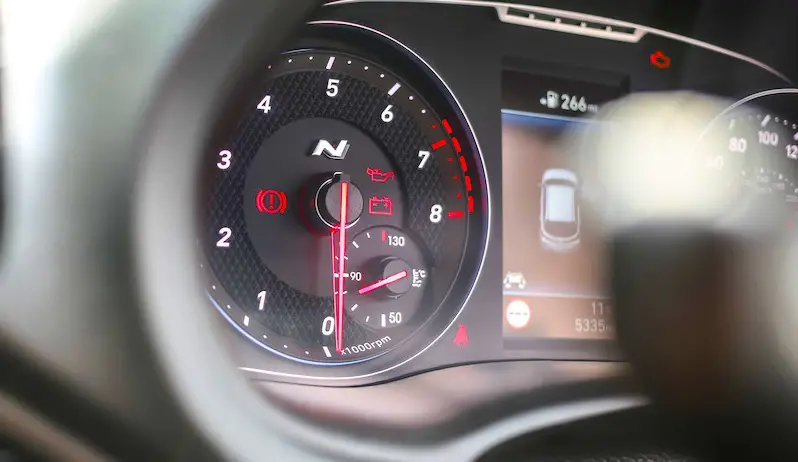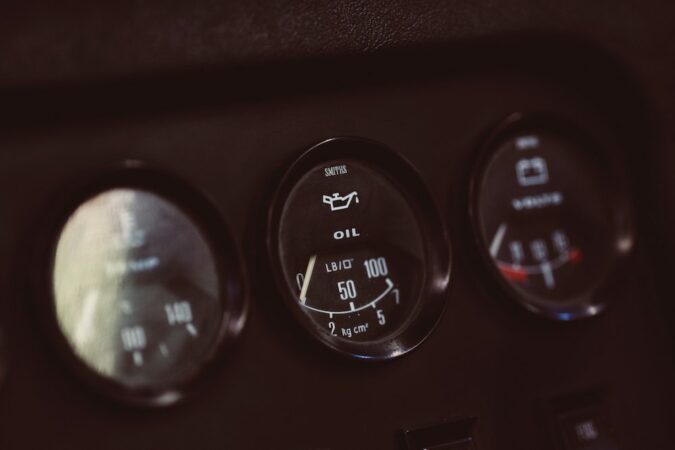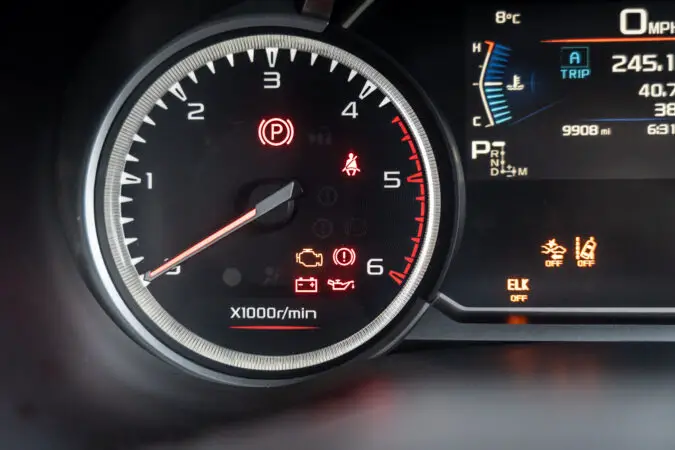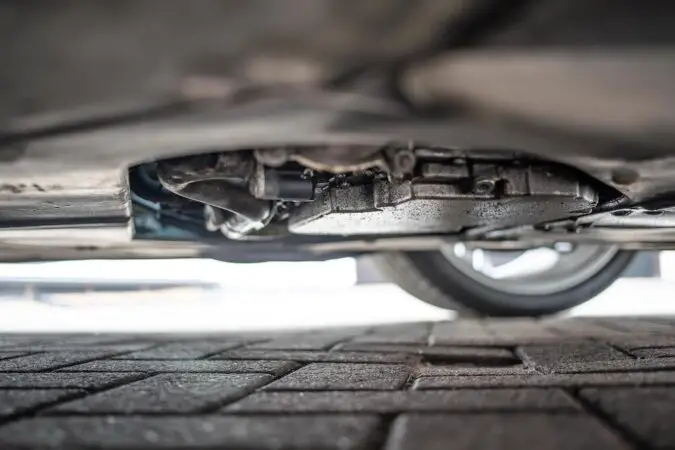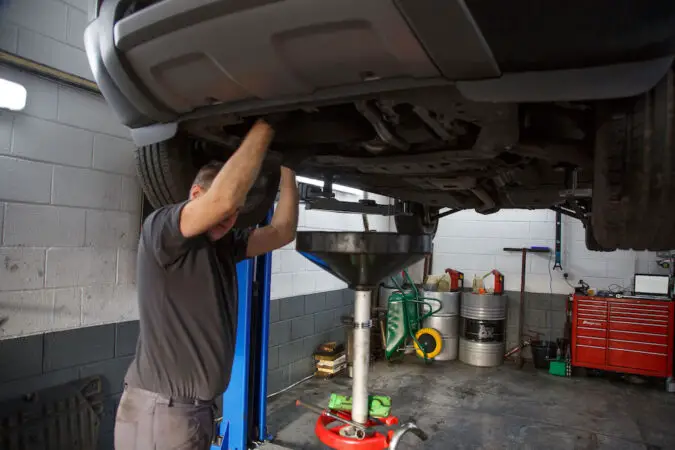Have you noticed how the oil pressure gauge is steadily rising and you noticed that the oil light is on as well? Well, if this is the case, then you are at the right place because we are going to cover everything you need to know when it comes to high pressure and how to tackle this problem.
Oil pressure is a serious topic. This is not something like a broken sensor or something trivial that doesn’t mean a lot. When the oil gauge is delivering some strange readings, you better stop the engine right away if you want to prevent some damage to be done to this engine.
If indeed there is a problem with the pressure, then you have a serious problem and this problem cannot wait. This means that you should visit a shop in order to have your engine checked properly.
An experienced technician needs to disassemble the engine in most cases, so it determines what could be wrong with it and what is causing this high oil pressure problem. But we also are going to help you out by listing the most common causes.
First, we are going to learn the basics of what is oil pressure in general and why it is so important. Then we will learn the types of pressure and the situations that you might come across when you have high oil pressure. Then we will cover the high oil pressure causes as well as the symptoms. After that, we will learn more about the possible fixes for these issues and the costs involved. So, if you want to learn more, follow along.
What Is Oil Pressure?
Now before we dive into the topic and learn more about the high oil pressure. Let’s first take a look and learn what is low pressure in general. I bet that there are a ton of people out there who are not that experienced and want to learn the basics. Once you know this stuff, you will be able to understand more about high oil pressure and what this problem is.
The oil pressure in simple words is basically determined by the resistance of the engine oil to flow inside of the engine.
As you probably know the oil pump is mounted on the bottom of the crankcase and there is an oil pickup tube. This oil pickup tube collects the oil with the help of the oil pump and pushes this oil whenever there is a need to do so.
So, this distribution should not be extremely smooth, nor extremely difficult, the ideal flow is somewhere in between.
So, if your oil flows really fast, it could mean that you have a low oil level or possibly engine wear that causes this problem. On the other hand, if the oil has trouble to flow which is high oil pressure, then you probably have some obstruction inside of the engine that does not allow the oil to flow. But more on the high oil pressure in the following chapter when we will elaborate more on the types of pressure.
Types Of Oil Pressure
Now before we learn more about the situation when you have high oil pressure. Let’s first learn the types of oil pressure that exist out there. Knowing this will be important to determine what is high, low, or normal oil pressure.
The first type is low pressure. This type is most often caused by a low restriction of the oil to flow. Meaning that the seals inside of the engine do not seal well and you have probably worn out rod bearings, piston rings, or even a low level of oil.
When you have low pressure, things are rather critical because it means that your engine is probably close to the end of its life and will need a serious rebuilding in order to be brought back to life. Low pressure is considered everything below 25 psi.
Then there is the normal pressure. When you have normal pressure, it means that the oil flow inside of the engine is pretty normal and in the recommended range. This is the type of pressure that you want to have inside of your engine because your engine will perform the best on this type of pressure. And the normal pressure is in the range between 25 psi and 65 psi. This is the sweet spot for many engines out there.
And the last type which is the main focus of our article is the high pressure. This type of pressure is when there is too much obstruction and engine oil is facing a lot of resistance when it comes to the proper flow. This means that the oil is not flowing as it should and is facing some obstructions inside of the passageways in the engine block.
Situations Of High Oil Pressure
Now let’s cover some of the most common situations when you have high oil pressure. Knowing these situations will be extra useful in order for you to quickly diagnose the problem and determine what could go wrong with the engine in the car.
The first situation is high oil pressure when cold. This situation is normal especially if you are using a low viscous oil at low temperatures. The oil is moving really slowly and the resistance will be high until the engine reaches optimum temperature.
But it can be damaging because until the oil gets warm, your engine will create a ton of friction. This is why you need to use good oil for winter temperatures.
Another situation is when you have high oil pressure after an oil change. This could be caused by overfilling the oil in your car. The extra motor oil will create higher pressure and will ruin the engine’s performance. Also, make sure that you use the right oil and not some thick oil that your engine shouldn’t be running with.
The third most common situations are the high oil pressure at idle and high oil pressure when accelerating. This is often the case because something in the engine is not right. The problem has to be checked by a mechanic and we could only guess what could cause this problem. But when it comes to the causes, let’s elaborate on them in the following chapters.
High Oil Pressure Causes
Now we can start discussing the causes of the problem. Knowing the causes of this problem will be really useful for you in order to tackle this issue quickly and effectively.
This is why we are going to cover them the best that we can. And describe in detail how these situations can affect your oil pressure and increase it significantly. So, let’s begin.
1. Bad Oil Pressure Sensor
The first and most common cause of the high oil pressure is the bad oil sensor. This sensor is also known as an oil pressure switch, or oil sending unit. It has the main role to monitor the pressure and tell you about the condition of the oil pressure in your engine.
So, when the oil pressure is too high, it could be the case because of a bad sensor. The sensor can fail and cause you trouble like this.
Whenever this happens, it is worth checking the oil as well as checking this sensor. If it leaks oil from the wiring plug, then it is probably bad and causing this problem to you.
These oil pressure sensors are also cheap and really affordable so it is a no-brainer to replace this sensor with a new one if you think that it could be one of the reasons for this problem with the increased pressure. Now let’s move on to the next probable cause.
2. Clogged Oil Filter
The second most common cause of the high oil pressure inside the engine is the situation with a clogged oil filter.
If you are a fan of delayed oil changes this will be actually the case. Why I’m saying this? Well, oil filters are designed to capture all the debris inside of the engine oil.
In this debris, there is gasket material, metallic particles, and whatnot. So, whenever you decide on delaying the replacement of the oil and the oil filter, you are basically ending up with an engine that has a filter that is obstructed.
An obstructed filter will prevent the proper flow inside of the engine. And could cause a delay in delivery and increase the pressure. Because as we already noted, the oil pressure is the resistance to flow. The bigger the resistance, the higher the pressure. So, do your oil changes regularly.
3. Oil Sludge In Engine
The next in our list of high oil pressure causes is the oil sludge inside of the engine. Another situation is if you are not doing your oil changes at the right interval.
A ton of people are delaying the oil flush intervals and there is a sludge buildup inside of the engine. This sludge buildup will basically start preventing the flow of oil at some points of your engine. This instance will inevitably lead to a situation also known as oil starvation and also increased oil pressure.
Whenever this is happening inside your engine you do not have the oil flowing where it should flow. So, if there is no oil, the engine will start to wear off at a much greater pace. You could end up throwing your engine in the scrap yard even after a few thousand miles in some cases.
So, if you own a car that has sludge in it. It is advised to get some cleaning solutions. There are solutions that you pour into your engine instead of the oil and they will clean the engine. Then flush the sludge and replace it with clean oil. But more on that later on after we finish the high oil pressure causes.
4. Bad Oil Pressure Release Valve
The next probable cause is the situation with the oil pressure release valve. This valve is also known as a high-pressure safety valve.
This valve is specifically designed in order so the oil filter housing does not explode when there is too much pressure.
The pressure release valve makes sure that the pressure doesn’t go above a certain limit of 65 psi. And when it does in some instances, this relief valve will open and will release the pressure that has built in the oil compartment.
So, a clear indication of high pressure is that this valve is broken and does not release the pressure. Still, in order for this valve to open the pressure should be high.
But if it doesn’t, then you definitely are having issues and the engine could simply blow the seals of the oil pan. Or destroy the oil filter housing and leak all of the oil on the street. And this will instantly kill your engine.
So, when the pressure levels get really high, it is worth checking things out instead of waiting for the inevitable and the engine destroying itself in bits and pieces.
5. Using The Wrong Oil
And the last in our list of high oil pressure causes is the situation when you are using the wrong type of oil.
Modern engines have recommended oil viscosity from the factory. And you can play with this viscosity up to a certain point. Because if you go over the top and you put some extra thick oil, you will basically ruin your engine.
The engine will run with high pressure because the oil will be so difficult to push around the engine. So, you might end up with a bad high pressure oil pump on your car. Or possibly with even greater engine damage that will result in scrapping the whole engine (for more insight, check out our guide on the free catalytic converter scrap price guide).
So, beware of the recommended oil and make sure that you get the right oil. This way you will avoid situations and problems with high oil pressure.
High Oil Pressure Symptoms
The next thing that we would like to cover is the high oil pressure symptoms. As you probably know, for every problem there are causes and symptoms.
So, in the case of the problem with high pressure. There will be symptoms that will be present when the pressure in the engine is too high and in the next chapters, we are going to cover them in detail.
1. Oil Light On
The first symptom when you are having this problem will be the oil light. The oil light will basically be on whenever you have low, or high pressure.
So, this oil light doesn’t tell you a lot by itself. This is why you should not take it for granted and draw conclusions from it. The next symptom is crucial for you to understand if you have high pressure.
2. Oil Pressure Gauge Reading High
And the next on our list of high oil pressure symptoms is the reading on the gauge. The gauge will jump to the max whenever the pressure rises.
Most of the engines have these gauges but some of them, unfortunately, don’t. Mainly because manufacturers do not like to include them. But this is crucial data and can be checked on the board computer if you are curious enough to learn what is the oil pressure if the oil light is on.
On some cars, you will even get a message that will tell you that your pressure is high and to turn off the engine immediately. As we said, this greatly depends from manufacturer to manufacturer. Now let’s cover the last symptom.
3. Oil Leaks
The third and last in our list of high oil pressure symptoms that we are going to cover is the situation with the oil leaks.
Whenever there is too much pressure, leaks are unavoidable. There could be leaks from a ton of different gaskets on the engine. So, if you have a sludgy engine that leaks oil from the sides, this could be good information. Mainly because your engine probably doesn’t run well.
This needs to be checked and inspected properly. But how you can diagnose and fix this problem? Let’s see more on that next.
How To Diagnose & Fix High Oil Pressure?
Now let’s move on to the next topic that we want to cover when it comes to high pressure and that is how to diagnose this problem. How you can tell if you run high pressure? Let’s elaborate.
Diagnosing this issue can be a rather tricky thing do to. The first and your main concern will be to check your car for leaks. First, check the oil level and see if it’s any good.
If it’s sludgy, then here lies your problem. You have an overdue oil change and this oil needs to go away along with the filter.
Also, as we said, inspect every gasket and seal for leaks. Because if there is high oil pressure. This pressure should escape from somewhere around the engine. The valve cover gaskets, oil pan gaskets, front and rear main seal, and oil filter suffer the most. Make sure that they are all nice and dry.
If all these components are good and your oil is good. You might want to get an OBD2 scanner (and learn how to use OBD2 scanner) and scan the car for codes. Maybe the oil pressure sensor is just broken. This is a really cheap part and if it’s broken, just replaced and problem solved. How you can test the sensor with a multimeter, you can check in the video above.
If nothing from our advice helps, then you might want to take your car to a mechanic. Probably there is some obstruction inside of the engine and needs to be cleaned. Overall, not a cheap job. But more on the price in the next chapter.
Cost To Fix High Oil Pressure
So, what is the cost to fix the problem with high oil pressure? Well, the answer to this question really depends on what is causing this problem.
If there is sludge inside of the oil, the oil needs to be flushed a few times. So, in this case, you can expect a repair from $100 to $300.
If there are problems with the pressure sensor, you can expect to pay about $150 to get it sorted out at a shop.
Oil Pressure Facts
- Oil pressure is determined by the resistance oil faces when flowing through the engine passages and is indicated by the oil pressure gauge.
- The ideal oil pressure range varies depending on the car brand and model but is generally between 25-65 PSI.
- High oil pressure is an indicator that the oil is not able to properly lubricate all parts of the engine, leading to wear, damage, and in extreme cases, engine failure.
- Factors like the size of the engine, diameter of bores, and viscosity of the oil impact oil pressure, and a PSI over 80 is usually considered too high for the engine.
- A malfunctioning oil pressure sending unit, a dirty or contaminated oil filter, blocked passages, and a relief valve malfunction are some of the causes of high oil pressure.
- Oil quality and viscosity also affect oil pressure, with thicker oil facing more resistance when passing through the passages.
- It is recommended to wait 20 minutes after starting up the engine to get an accurate oil pressure reading as oil becomes thinner when heated and thicker when cooled.
- Low oil pressure can also be an issue and can be caused by factors such as a low oil level, a malfunctioning oil pump, or a faulty oil pressure relief valve.
- Regular oil changes and filter replacements help to maintain proper oil pressure and prevent engine damage.
- If you notice fluctuations or irregularities in your oil pressure readings, it is best to have a professional mechanic diagnose and fix the issue promptly.
Conclusion
In this article, we have covered quite a bit when it comes to the problem with high pressure. First, we learned more about what is oil pressure in general and the types that are there.
Then we learned the situations, causes, and symptoms of this problem. After that, we learned how you can diagnose and fix the issue and at what cost is this possible.
F.A.Q
Now let’s answer some frequently asked questions.
What Does High Oil Pressure Mean
This means that the flow of oil inside of the engine is obstructed at some point. This means that the oil has trouble reaching some points of the engine and this situation is building up the pressure.
What Is Considered High Oil Pressure
High pressure is considered any pressure that is higher than 65 PSI. And this is a serious pressure that you don’t want to expose your engine on. Make sure that you sort out the problem as soon as possible if you don’t want to ruin the engine.
What Causes High Oil Pressure
Common causes for this situation are obstructions in the oil flow. More precisely a clogged oil filter, sludgy oil, and an overall poorly maintained engine. Sometimes the pressure sensor can fail and also cause this problem as well.
Why Is My Oil Pressure High
Your engine probably has some sludge on the inside that is preventing the oil flow. You need to make sure that the engine oil is clean as well as the oil filter. If they are not, flush the oil and replace the filter. Also if everything is good with the oil, check the oil sensor and see if its faulty.
How Long Can I Drive With High Oil Pressure
Driving with this type of condition is not recommended at all. You should stop driving immediately if you indeed have high pressure. Mainly because something could fail and cause big leaks of oil from the engine.
How To Fix High Oil Pressure
Fixing this problem will require good diagnostics to be performed. And then based on this diagnosis, the problem is going to be solved. Sometimes flushing the oil fixes the issue. Sometimes the problem is much bigger than this and will require more work to be done to the engine.

